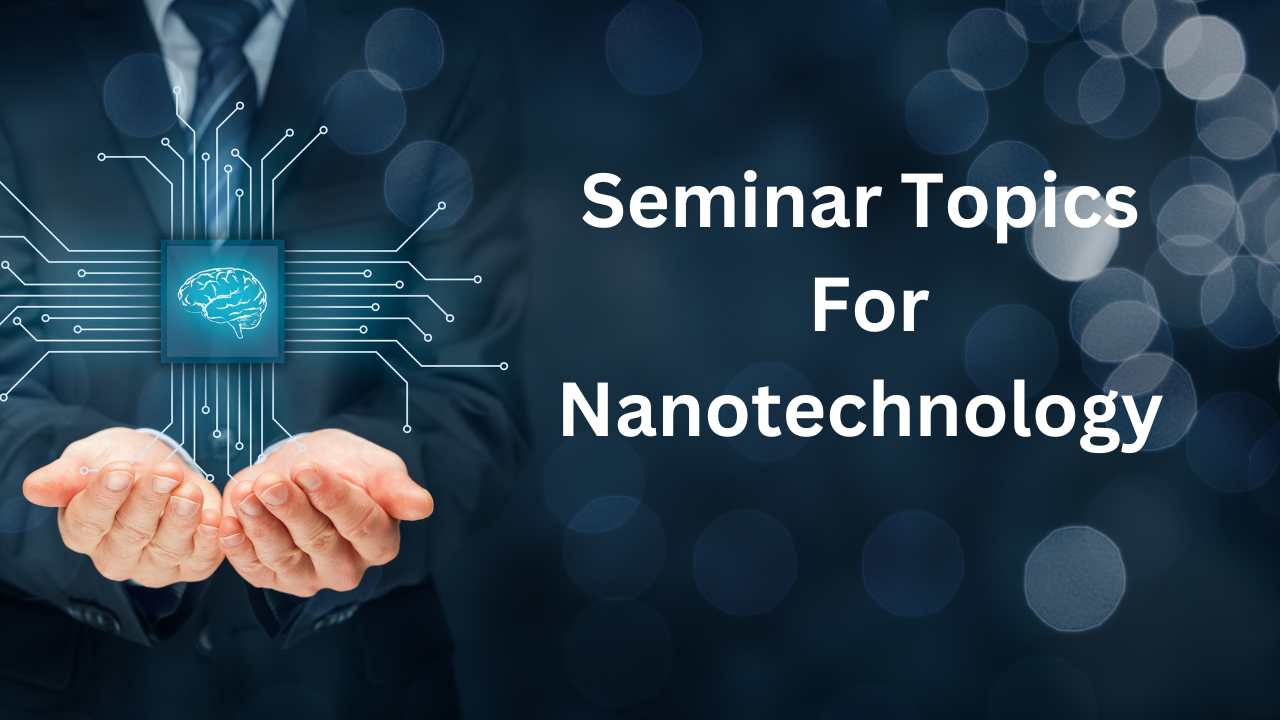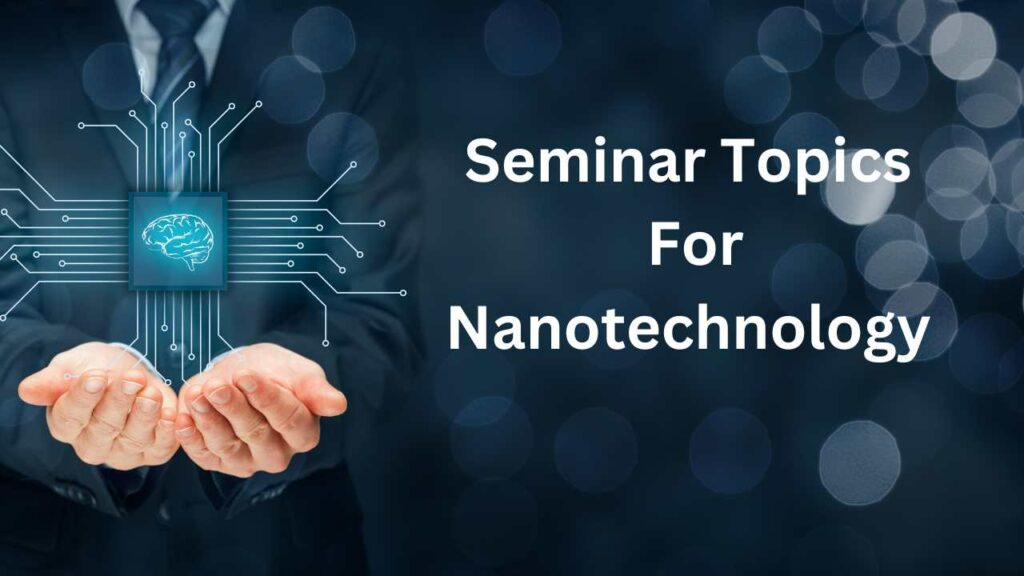Seminar Topics For Nanotechnology 2023

Seminar Topics For Nanotechnology 2023 | Nanotechnology is rapidly gaining importance in many fields, from electronics to healthcare. It is a branch of science and engineering that deals with the study and manipulation of matter at extremely small scales, often as small as individual atoms and molecules.
With such a broad reach, there are multiple topics and areas of innovation to explore within nanotechnology.
In this blog post, we will be discussing some of the most interesting seminar topics for Nanotechnology in English language.
Whether you’re a student looking for inspiration or an industry professional searching for new ideas, this article will help you dive deeper into this exciting field. So buckle up and let’s get started.
Contents [hide]
- 1 Nanomaterials and Their Applications
- 2 Nanotechnology in Medicine and Healthcare
- 3 Nanotechnology in Energy and Environment
- 4 Nanoelectronics and Nanophotonics
- 5 Nanomanufacturing and Nanofabrication Techniques
- 6 Nanosensors and Nanodevices
- 7 Nanorobotics and Nanomedicine
- 8 Ethical and Safety Considerations in Nanotechnology
- 9 Nanotechnology in Agriculture and Food Industry
- 10 Nanotechnology in Information Technology
- 11 Nanotechnology in Cosmetics and Personal Care
- 12 Nanotechnology in Construction and Infrastructure
- 13 Nanotechnology in Textiles and Fashion
- 14 Future Prospects and Challenges in Nanotechnology
- 15 List of Seminar Topics For Nanotechnology 2023
- 16 Conclusion
Nanomaterials and Their Applications
This topic would explore different types of nanomaterials, such as nanoparticles, nanotubes, and nanocomposites. It would discuss their synthesis methods, characterization techniques, and highlight their applications in areas such as electronics, aerospace, and biomedical engineering.
Nanotechnology in Medicine and Healthcare
This segment would focus on the revolutionary applications of nanotechnology in medicine and healthcare. It would discuss targeted drug delivery systems, nanoscale imaging techniques, and the potential of nanomedicine in diagnostics, therapeutics, and regenerative medicine.
Nanotechnology in Energy and Environment
Here, the seminar would explore how nanotechnology can contribute to the development of clean energy solutions and environmental remediation. It would cover topics such as nanoscale solar cells, energy storage devices, water purification technologies, and pollution monitoring using nanosensors.
Nanoelectronics and Nanophotonics
This section would delve into the world of nanoelectronics and nanophotonics, where nanoscale devices and structures are employed for faster and more efficient electronic components and optical systems. It would discuss advancements in nanofabrication techniques, quantum computing, and nanophotonic devices like nanolasers.
Nanomanufacturing and Nanofabrication Techniques
Here, the seminar would focus on the techniques and processes used in nanomanufacturing and nanofabrication. It would explore lithography, self-assembly methods, molecular beam epitaxy, and other fabrication techniques to create nanoscale structures and devices.
Nanosensors and Nanodevices
This topic would discuss the development of nanosensors and nanodevices for applications in areas such as environmental monitoring, healthcare, and security. It would cover the principles behind nanosensors, their fabrication, and their integration into various systems.
Nanorobotics and Nanomedicine
In this section, the seminar would explore the emerging field of nanorobotics and its potential in medicine. It would discuss nanorobots designed for targeted drug delivery, minimally invasive surgeries, and tissue engineering, showcasing their benefits and challenges.
Ethical and Safety Considerations in Nanotechnology
This important topic would address the ethical implications and safety concerns associated with nanotechnology. It would cover issues such as nanotoxicology, responsible research practices, societal impact, and the need for regulations to ensure the responsible development and use of nanomaterials.
Nanotechnology in Agriculture and Food Industry
Here, the seminar would explore the applications of nanotechnology in agriculture and the food industry. It would discuss nanoscale delivery systems for pesticides, sensors for crop monitoring, and the potential of nanotechnology in enhancing food quality, safety, and storage.
Nanotechnology in Information Technology
This section would focus on how nanotechnology is revolutionizing the information technology sector. It would cover topics such as nanoscale memory devices, quantum computing, nanophotonics for data transmission, and the integration of nanotechnology with existing computing systems.
Nanotechnology in Cosmetics and Personal Care
The seminar would discuss the utilization of nanotechnology in cosmetics and personal care products. It would explore the development of nanoemulsions, nanocarriers for targeted delivery of skincare ingredients, and the benefits of nanotechnology in sunscreen formulations.
Nanotechnology in Construction and Infrastructure
This topic would highlight the potential of nanotechnology in revolutionizing the construction industry. It would cover self-healing concrete, smart materials with improved mechanical properties, and nanocoatings for corrosion protection and durability enhancement.
Nanotechnology in Textiles and Fashion
This section would explore the applications of nanotechnology in the textile and fashion industry. It would discuss nanofabrication techniques for producing smart textiles with properties like stain resistance, UV protection, and antimicrobial properties, along with other innovative applications.
Future Prospects and Challenges in Nanotechnology
The seminar would conclude by discussing the future prospects and challenges in the field of nanotechnology. It would explore potential breakthroughs, emerging research areas, and the importance of interdisciplinary collaboration in advancing nanotechnology further.
Seminar Topics For Mathematics
List of Seminar Topics For Nanotechnology 2023

Nanomaterials for energy applications
Nanoparticles for drug delivery
Nanoelectronics and nanophotonics
Nanomaterials for environmental remediation
Nanotechnology in medicine
Nanostructured materials for sensors and biosensors
Nanofabrication techniques
Nanomaterials for solar energy conversion
Nanomaterials for energy storage
Nanotechnology in agriculture
Nanomaterials for water treatment
Carbon nanotubes and their applications
Nanoparticles for cancer treatment
Nanomaterials for catalysis
Nanotechnology in food industry
Nanomaterials for tissue engineering
Nanostructured polymers and their applications
Nanotechnology in cosmetics
Nanotechnology in sports equipment
Nanotechnology in construction industry
Nanomaterials for magnetic applications
Nanomaterials for thermal management
Nanotechnology in energy-efficient buildings
Nanoscale materials for corrosion protection
Nanotechnology in space exploration
Nanotechnology in fashion industry
Nanotechnology in defense and security
Nanotechnology in medicine: Current applications and future prospects.
The impact of nanotechnology on the energy sector.
The role of nanotechnology in environmental remediation.
The use of nanotechnology for water purification.
Nanomaterials for catalysis: Opportunities and challenges.
The potential of nanotechnology in agriculture and food systems.
Advances in nanofabrication techniques for nanoscale devices.
Nanotechnology for energy harvesting and storage.
The role of nanotechnology in the development of next-generation electronics.
The ethics of nanotechnology: A critical analysis.
The potential of nanotechnology in the fight against cancer.
Nanotechnology for sensing and detection applications.
Nanomaterials for renewable energy technologies.
The impact of nanotechnology on the aerospace industry.
The use of nanotechnology for drug delivery.
The potential of nanotechnology in the development of personalized medicine.
The role of nanotechnology in the development of biosensors.
Nanotechnology in textiles: Enhancing performance and functionality.
Nanotechnology in the construction industry: Current status and future prospects.
The use of nanotechnology in food packaging and preservation.
The potential of nanotechnology in the development of quantum computing.
The impact of nanotechnology on the development of artificial intelligence.
Nanotechnology for water desalination and treatment.
The potential of nanotechnology in the development of new materials for 3D printing.
Nanoparticles for targeted gene therapy.
The use of nanotechnology in the development of flexible and wearable electronics.
The role of nanotechnology in the development of smart materials and structures.
The potential of nanotechnology in the development of hydrogen storage systems.
The use of nanotechnology in the development of anti-reflective coatings for solar cells.
Nanotechnology in the automotive industry: Current applications and future prospects.
The impact of nanotechnology on the development of robotics.
The potential of nanotechnology in the development of biodegradable materials.
The use of nanotechnology in the development of advanced sensors for healthcare.
The role of nanotechnology in the development of novel drug delivery systems.
The potential of nanotechnology in the development of high-performance batteries.
The use of nanotechnology in the development of advanced coatings for corrosion protection.
The impact of nanotechnology on the development of flexible electronics.
The potential of nanotechnology in the development of nanorobotics for medical applications.
Nanotechnology for the development of high-efficiency lighting systems.
The use of nanotechnology in the development of intelligent packaging systems.
Nanotechnology in the automotive industry
Nanotechnology in aviation industry
Nanostructured materials for biomedical applications
Nanoparticles for gene delivery
Nanotechnology in water desalination
Nanotechnology in waste management
Nanotechnology in textile industry
Nanomaterials for flexible electronics
Nanotechnology in the entertainment industry
Nanomaterials for solar cells
Nanotechnology in printing industry
Nanomaterials for sound absorption
Nanotechnology in optoelectronics
Nanotechnology in robotics
Nanomaterials for electrochromic applications
Nanotechnology in agriculture pest management
Nanotechnology in artificial intelligence
Nanomaterials for gas sensors
Nanotechnology in disaster management
Nanotechnology in urban planning
Nanotechnology in transportation
Nanomaterials for water splitting
Nanomaterials for hydrogen storage
Nanotechnology in sports medicine
Nanomaterials for anti-fouling coatings
Nanomaterials for energy-efficient lighting
Nanomaterials for quantum computing
Nanotechnology in power electronics
Nanotechnology in mining and minerals industry
Nanomaterials for environmental monitoring
Nanomaterials for smart packaging
Nanotechnology in marine industry
Nanomaterials for biomedical implants
Nanotechnology in food packaging
Nanotechnology in forensics
Nanomaterials for self-cleaning surfaces
Nanotechnology in education
Nanotechnology in renewable energy
Nanotechnology in the pharmaceutical industry
Nanotechnology in biomedical imaging
Nanomaterials for transparent conductive films
Nanotechnology in agriculture soil management
Nanomaterials for MEMS (microelectromechanical systems)
Nanomaterials for 3D printing
Nanotechnology in finance
Nanotechnology in energy distribution
Nanomaterials for quantum dot displays
Nanotechnology in horticulture
Nanotechnology in oil and gas industry
Nanotechnology in artificial organs
Nanomaterials for electrochemical energy conversion
Nanotechnology in aviation safety
Nanotechnology in wildlife conservation
Nanomaterials for thermoelectric devices
Nanotechnology in carbon capture and
Seminar Topics for Social Science.
Conclusion
In conclusion, nanotechnology offers endless possibilities for innovation and transformation across various industries. The seminar topics mentioned above provide a comprehensive overview of the diverse applications and advancements in nanotechnology. By exploring these topics, attendees can gain valuable insights into the current state and future potential of this exciting field.
